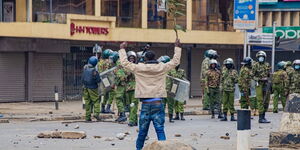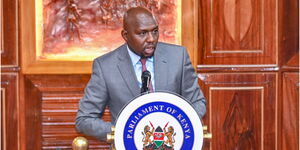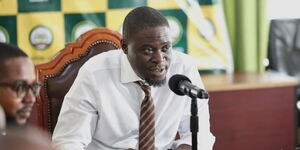Nairobi City Lawyer Cliff Ombeta on Friday, May 12, weighed in on the case pitting the state against self-proclaimed messiah, Eliud Wekesa, popularly known as Yesu wa Tongaren.
While responding to claims that he was ready to represent the preacher pro bono, Ombeta agreed maintaining that Yesu wa Tongaren was innocent.
The criminal lawyer, as a result, asked Bungoma Police officers to release the New Jerusalem Church's pastor.
"Let Yesu of Tongaren go," Ombeta stated as he stirred up a discussion on whether the name 'Jesus' was protected by law.
The lawyer further explained that the government will embarrass itself by charging someone who was just living his peaceful life in Tongaren without causing any harm to anyone.
According to Ombeta, arresting Wekesa for calling himself Yesu (Jesus) was unjustified since he did not claim to be Jesus of Nazareth, he only called himself Yesu wa Tongaren.
"Is the name Yesu personal or universal? He says he is Yesu wa Tongaren, and not Jesus of Nazareth. Do we have a case against him?" Ombeta wondered.
In his statement, Ombeta also alluded that there were many people in the world who have been named after saints, kings and judges whose names were contained in the Holy Bible. He argued that the individuals were yet to be accused of breaking the law merely because they were given Biblical names.
"What about present-day John, James, David and many more biblical names?" he further questioned.
Copyright Law in Kenya
The Copyright Act, 2001 (Act No. 12 of 2001, as amended up to Act No. 11 of 2017) is the principal legislation in Kenya that governs copyright. The Act provides for the protection of copyright in literary, musical, artistic, dramatic, audio-visual, sound recording, broadcast, computer programs (Apps), and other works.
The Act also provides for the enforcement of copyright, including the power to take civil and criminal action against infringers. The Copyright Board is the government agency responsible for administering and enforcing the Copyright Act.
The following are some of the key provisions of the Copyright Act, of 2001:
Copyright protection is granted to original literary, musical, artistic, dramatic, audio-visual, sound recording, broadcast, computer programs (Apps), and other works.
Copyright protection subsists in a work from the moment of its creation. The owner of the copyright in a work has the exclusive right to reproduce the work, to perform the work in public, to make a sound recording of the work, to broadcast the work, to communicate the work to the public, to make an adaptation of the work, and to distribute copies of the work to the public.
Copyright protection is not granted to ideas, procedures, methods of operation, concepts, principles, or discoveries. Copyright protection is also not granted to works that are in the public domain.
The Copyright Act of 2001 is an important piece of legislation that protects the rights of copyright owners in Kenya. The Act provides for a number of remedies for copyright infringement, including civil and criminal penalties. The Copyright Board is responsible for administering and enforcing the Copyright Act.












